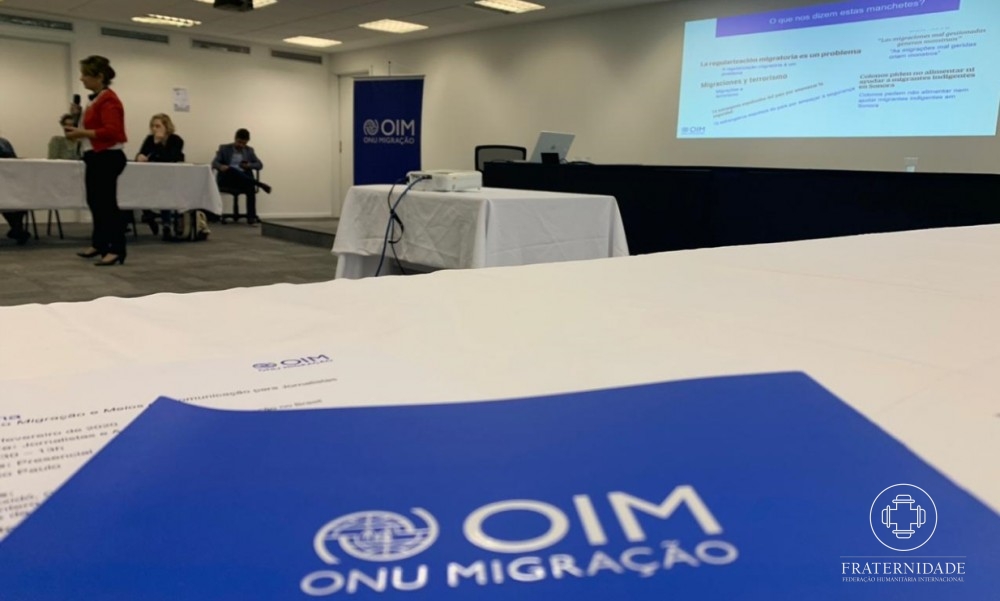The International Organization for Migration (IOM) carried out a training for journalists called Migration and Media on February 6, in the auditorium of the Federal Public Defense, in the city of Sao Paulo. More than 20 professionals from different communication vehicles and organizations that are partners of IMO and are active in Latin America, such as the Fraternidade-International Humanitarian Federation (FIHF).
The objective of the training was to touch on the importance of journalistic coverage on the migratory topics and how the media can contribute to avoiding the creation of stereotypes, which can prevent racism and demolish myths that distort the image of migrants in South America and the world.
“As you are social communicators and opinion leaders, you can help us to spread true and clear information about the reality of migration, which is a complex phenomenon and should, therefore, be focused in an integral way. Some information often distorts reality, and the population does not understand it, and judge migrants in a comprehensive way”, warned the expert in Labor Migration and Development, Ricardo Cordero, who spoke to the journalists through a recorded video.
The communication coordinator of IMO for South America, Juliana Quintero, reinforced the idea that “a good journalistic content contributes to sensitize both the target communities and the migrants themselves about their rights, besides facilitating their integration.”
World migration in numbers
According to the regional officer of Partnerships and Policies of IOM for South America, Ezequiel Texidó, the phenomenon of migrations is directly related to lack of work, environmental disasters, economic, social and political crises, among others.
In 2019, more than 1 billion migrants were registered by the United Nations Department of Economic and Social Affairs in the whole world. Altogether, 3,5% of the population of the planet is composed of migrants, that is, of each 30 people, 1 is a migrant.
The number of international migrants in the Americas increased from 47 million in 2000 to 70.3 million in 2019. Of these, 3.9 million are Venezuelan refugees and migrants in Latin America and the Caribbean. The countries that most receive them are: Colombia (1.6 million), Peru (863.6 thousand), Ecuador (385 thousand), Chile (371.2 thousand), Brazil (253.6 thousand).
Juliana Quintero states that the precision and contextualization of information also help better understand the challenges about migration, its advances and conquests. “The more data and research we present, the less prejudice we will have to oppose.” Juliana also suggested that journalists always base their writings on official numbers, and quotes, as a reference, the R4V Platform, a Brazilian page that brings to the public the most recent data about the Venezuelan migratory flux.
The journalist mentioned the example of a study of Transatlantic Trends 2010, which included eight welcoming countries (Canada, France, Germany, Italy, Holland, Spain, United Kingdom and the United States) and show that, in each country, those surveyed tended to overestimate the number of migrants that live in their countries.
“To be a refugee is not a choice, it is not to have choices”
About 253 thousand Venezuelans have come to Brazil, mainly to the cities of Boa Vista, Pacaraima and Manaus. To respond to the needs of these displaced people, and guarantee their social and economic inclusion in the communities that welcome them, the Fraternidade-International Humanitarian Federation (FIHF) has been active since 2016, together with the United Nations High Commissioner for Refugees (UNHCR), the United Nations Children’s Fund (UNICEF), the Brazilian Armed Forces and several institutions of the public power, entrepreneurs and the civil society.
Today, the Humanitarian Fraternidade (FIHF) is the manager of five shelters in Roraima, and is getting ready to give support in other cities of Brazil. According to Friar Luciano, the general manager of the Humanitarian Fraternidade (FIHF), “it is very important to understand that a humanitarian crisis is very different from a mere social crisis, as in the humanitarian crisis people have lost their family members, material goods, professions, leaving behind many things constructed and consolidated, and leave for the unknown, with a sequence of traumas that can interfere in the quest for a new opportunity.”
Friar Luciano also highlights that “being a refugee is not a choice, it is not to have a choice. And as this situation is unprecedented in Brazil, we need to seek together, in a multidisciplinary way, beneficial solutions also for the welcoming local populations, so that this may have a constructive way out in the medium and long run.”
To know more about the Humanitarian Missions carried out by the Fraternidade-International Humanitarian Federation (FIHF) in Roraima and in other localities.








